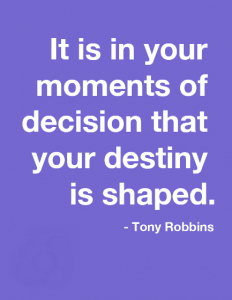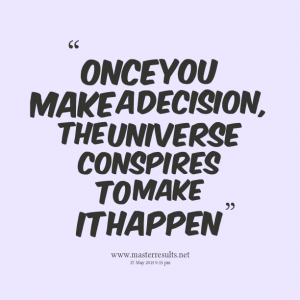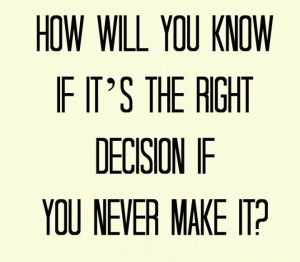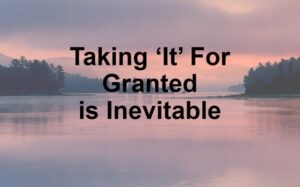Have you ever asked someone a question and had them answer, “I don’t know,”? Of course you have, and sometimes that the correct answer. If you ask them a question regarding a piece of knowledge or information that they don’t possess, then the correct answer for them to give you is, “I don’t know.” However, if the question is about a piece of personal information such as a preference in where to eat dinner and they answer, “I don’t know,” then it can get a bit frustrating. What I’ve found to be even worse is when I get no answer at all.
 I’ve long understood – for as far back as I can remember – that NOT making a decision is, by default, making a decision. If you have to choose between two courses of action and one of them requires some effort or conscious choice on your part, but you don’t make that choice or you fail to make that effort, then the other course of action will become reality. SOMETHING is going to happen. You can have some measure of control over what happens or you can do nothing and sit back as a victim of the whims of fate.
I’ve long understood – for as far back as I can remember – that NOT making a decision is, by default, making a decision. If you have to choose between two courses of action and one of them requires some effort or conscious choice on your part, but you don’t make that choice or you fail to make that effort, then the other course of action will become reality. SOMETHING is going to happen. You can have some measure of control over what happens or you can do nothing and sit back as a victim of the whims of fate.
It’s been my experience that most people who do that – sit back and do nothing – then complain about being a victim of fate. I get tired of trying to explain to them that they’re a victim of their own indecision; that if they’d made a decision and taken an action then things might have turned out differently. I try to help them understand that by NOT making a conscious choice and acting on that choice then they leave themselves open to the vagaries of chance. Most of them don’t get it. Some of them are actually afraid of taking control of their lives (because then they could be responsible for the bad stuff that happens) or they’re not intelligent enough to analyze the options and make their preferred choice, so they just let “life happen” and they go along for the ride.
It dawned on me recently that answering questions can be an example of this. If someone asks you a yes or no question and you fail to answer, then the default answer is no. Why? Think about it. If I ask you, “Would you like to go out?” and you don’t say YES, then my assumption has to be NO. The YES answer requires interest, effort, cooperation and motivation on your part. If I don’t get a YES from you then I have to assume NO because I can’t control the situation enough to assume YES.
 My follow on revelation was that the people who so often don’t answer a question with NO are simply not wanting to take responsibility for the answer. Instead of saying, “I’m not sure,” “Yes,” or “No,” they just don’t answer at all. That way the can tell themselves they’re not responsible for whatever YOU perceive as a result of their answer. What they don’t realize – or do realize but don’t care about – is that by not giving any answer at all, they’ve said, “No,” without verbalizing it.
My follow on revelation was that the people who so often don’t answer a question with NO are simply not wanting to take responsibility for the answer. Instead of saying, “I’m not sure,” “Yes,” or “No,” they just don’t answer at all. That way the can tell themselves they’re not responsible for whatever YOU perceive as a result of their answer. What they don’t realize – or do realize but don’t care about – is that by not giving any answer at all, they’ve said, “No,” without verbalizing it.
This lack of an answer also gives that person an excuse to blame you if they don’t get what they want. Example: If you ask your girlfriend (or boyfriend) if they want to do something and they don’t answer you; they don’t say yes but they don’t say no; they just leave the question hanging, change the topic of conversation, etc. And then the time frame of opportunity passes and that something is no longer an option. Lo and behold, then they start complaining that you didn’t go and do that something. This can be immensely frustrating for the person who suggested an activity in the first place, didn’t get an answer and now is being blamed for not making it happen. The person who failed (or refused) to answer is now blaming YOU because THEY didn’t get what THEY wanted – because of their own indecision but it’s all your fault!
I sometimes just shake my head. What are we to do with or about these indecisive people in our lives and all the frustration they cause? Especially since that frustration brings with it increased stress? I have to honestly say, “I don’t know.” It’s easy if these people are merely acquaintances or workmates who don’t matter in the long run of your life. If they aren’t people you truly care about and their lack of decision making ability is merely a nuisance to you, then I’d advise against really spending any time worrying about it. Identify them and then structure your work efforts so that their indecision is of minimal impact on your success.
 However, if they are people you care about then you can’t just dismiss them from your life or intentionally minimize your exposure to them in any given day. If those indecisive people are your children you can counsel and education them to help them learn decision making skills and then coach their judgment in an on-going basis to help improve their decision making. If the person, though, is your significant other, you have some serious work ahead. It’s the rare relationship that can withstand poor communication and indecisiveness is one contributing factor of poor communication. THAT is an obstacle that has to be identified, addressed and worked on steadily as an investment in a secure and strong future relationship.
However, if they are people you care about then you can’t just dismiss them from your life or intentionally minimize your exposure to them in any given day. If those indecisive people are your children you can counsel and education them to help them learn decision making skills and then coach their judgment in an on-going basis to help improve their decision making. If the person, though, is your significant other, you have some serious work ahead. It’s the rare relationship that can withstand poor communication and indecisiveness is one contributing factor of poor communication. THAT is an obstacle that has to be identified, addressed and worked on steadily as an investment in a secure and strong future relationship.
– – – – – – – – – –
If you appreciated this blog entry, please check out the author’s book, “Above Dirt: Motivational Thoughts Supporting A Positive Outlook,” available on Kindle HERE.
– – – – – – – – – – –
This entry is part of the book “A Fork In The Road; Navigating Your Path of Life with Motivation.” To read the complete entry and enjoy all of the other similar works, please purchase the book on Amazon.com by following this link: http://amzn.to/2j0T4D0
Thank you for your readership and your interest!




